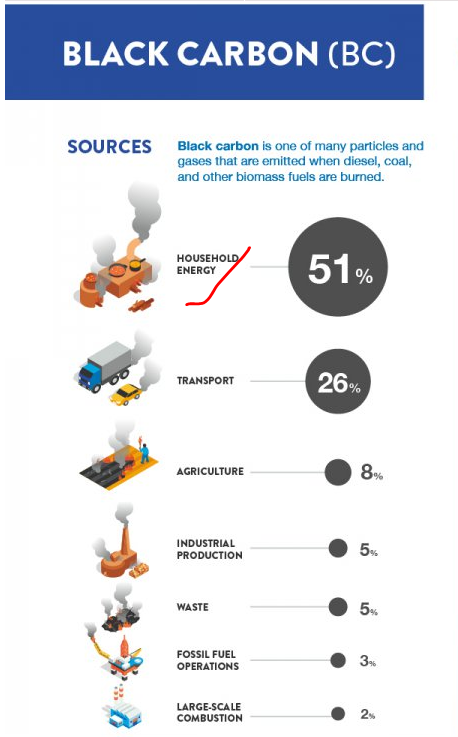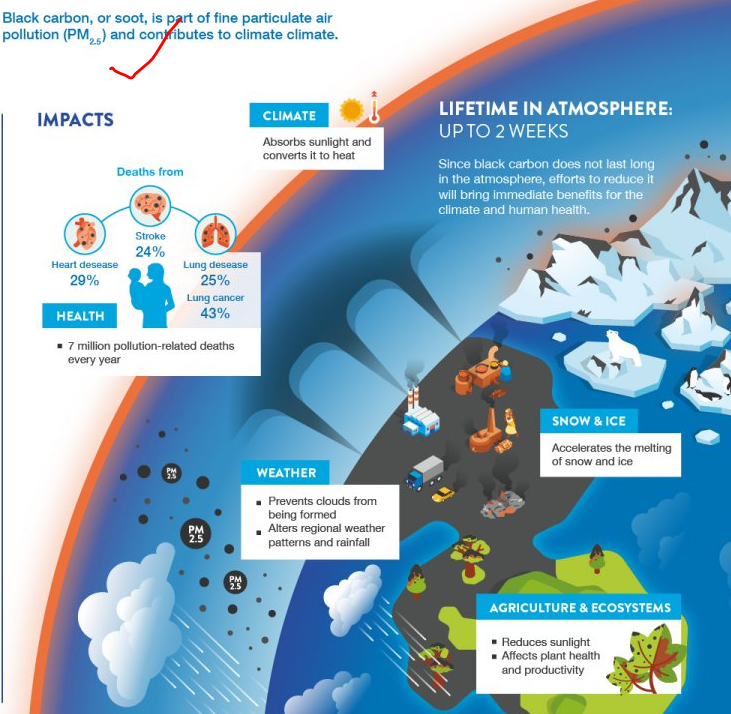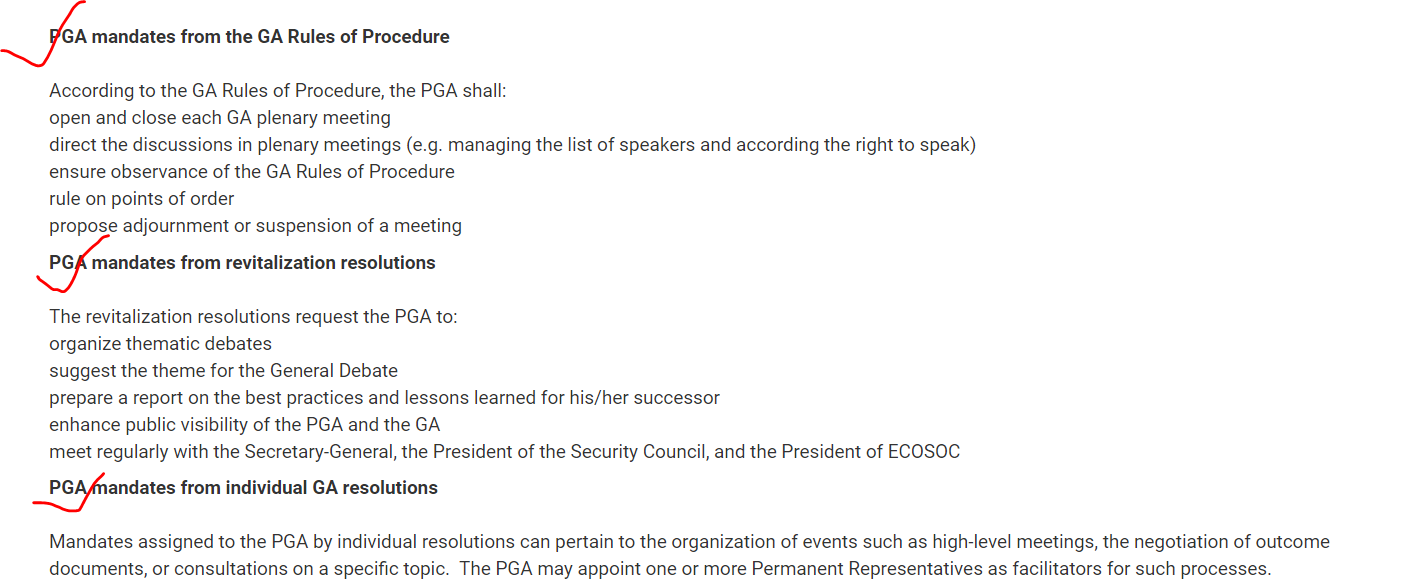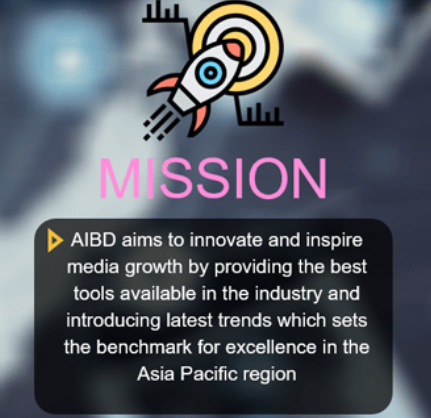Goaltide Daily Current Affairs 2024
Current Affair 1:
Black Carbon
Black carbon, or soot, is part of fine particulate air pollution (PM2.5) and contributes to climate change.
Black carbon is formed by the incomplete combustion of fossil fuels, wood and other fuels. Complete combustion would turn all carbon in the fuel into carbon dioxide (CO2), but combustion is never complete and CO2, carbon monoxide, volatile organic compounds, and organic carbon and black carbon particles are all formed in the process. The complex mixture of particulate matter resulting from incomplete combustion is often referred to as soot.

Black carbon is a short-lived climate pollutant with a lifetime of only days to weeks after release in the atmosphere.

During this short period of time, black carbon can have significant direct and indirect impacts on the climate, the cryosphere (snow and ice), agriculture and human health.

|
WHAT ARE SHORT-LIVED CLIMATE POLLUTANTS? Short-lived climate pollutants are powerful climate forcers that remain in the atmosphere for a much shorter period of time than carbon dioxide (CO2), yet their potential to warm the atmosphere can be many times greater. Certain short-lived climate pollutants are also dangerous air pollutants that have harmful effects for people, ecosystems and agricultural productivity. The short-lived climate pollutants black carbon, methane, tropospheric ozone, and hydrofluorocarbons are the most important contributors to the man-made global greenhouse effect after carbon dioxide, responsible for up to 45% of current global warming. If no action to reduce emissions of these pollutants is taken in the coming decades, they are expected to account for as much as half of warming caused by human activity. |
Current Affair 2:
United Nation General Assembly
Established in 1945 under the Charter of the United Nations, the General Assembly occupies a central position as the chief deliberative, policymaking and representative organ of the United Nations. Comprised of all 193 Members of the United Nations, it provides a unique forum for multilateral discussion of the full spectrum of international issues covered by the Charter. It also plays a significant role in the process of standard-setting and the codification of international law.
Each member has one vote.
All UN Member States are represented in the General Assembly. Each Member State has one vote. Decisions on such key issues as international peace and security, admitting new members and the UN budget are decided by a two-thirds majority. Other matters are decided by simple majority. Many decisions are reached by consensus without a formal vote.
In recent years, an effort has been made to achieve consensus on issues, rather than deciding by a formal vote, thus strengthening support for the Assembly’s decisions.
How President is elected?
Any Member State can put forward a candidate for President of the General Assembly (PGA). He/she is not required to be, but always has been, a citizen of the Member State presenting the candidacy. The PGA is elected in his/her personal capacity and for the duration of the term of office represents the membership as a whole.
The Member State of the PGA cannot at the same time hold the office of Vice-President or Chair of a Main Committee. Thus, the five permanent members of the Security Council, who are always Vice-Presidents, cannot hold the office of the PGA.
The President is elected by a simple majority vote of the GA. The President is elected at least three months before formally assuming office, usually in mid-June. This allows him/her to prepare and to assemble a team before the GA session begins in September.
What is the role and mandate of the PGA?
The PGA is the guardian of the GA Rules of Procedure but has no say in the actual decision-making of the GA – in fact, the PGA does not have a vote in the GA. Even on procedural matters, the PGA always remains under the authority of the GA.
The Charter of the UN establishes only the function of the PGA. The exact role and mandate have been defined and agreed on by the GA and are described in the GA Rules of Procedure, in GA revitalization resolutions, and in other GA resolutions which assign responsibilities and tasks to the PGA.
Just read once:

How are the Vice-Presidents elected?
The GA elects the twenty-one Vice-Presidents for the next session on the day of the election of the PGA. Like the PGA, the Vice-Presidents formally assume office at the opening of the GA session. The five permanent members of the Security Council are always among the Vice-Presidents. To ensure balanced geographical representation, the remaining Vice-Presidencies are distributed among the regional groups as follows:
- 6 members from the Group of African States
- 5 members from the Group of Asian States
- 1 member from the Group of Eastern European States
- 3 members from the Group of Latin American States
- 2 members from the Western European or other States Group
Current Affair 3:
What is Pacific Meridional Mode (PMM)?
Pacific Meridional Mode (PMM) is a climate mode in the North Pacific. In its positive state, it is characterized by the coupling of weaker trade winds in the northeast Pacific Ocean with decreased evaporation over the ocean, thus increasing sea surface temperatures (SST); and the reverse during its negative state.
This coupling develops during the winter months and spreads south-westward towards the equator and the central and western Pacific during spring, until it reaches the Intertropical Convergence Zone (ITCZ), which tends to shift north in response to a positive PMM.
Watch this small video to understand more clearly PMM: https://www.youtube.com/watch?v=Sc3tOEcM0YE&ab_channel=MetOffice-LearnAboutWeather
There are actually two meridional modes, one in the Atlantic and one in the Pacific.
Current Affair 4:
Asia-Pacific Institute for Broadcasting Development (AIBD)
The Asia-Pacific Institute for Broadcasting Development (AIBD) was established in August 1977 under the auspices of the United Nations Educational, Scientific and Cultural Organisation (UNESCO).
It is a unique regional inter-governmental organisation servicing countries of the United Nations Economic and Social Commission for Asia and the Pacific (UN-ESCAP) in the field of electronic media development. It is hosted by the Government of Malaysia and the secretariat is located in Kuala Lumpur.


The 26 full members of AIBD are the governments of the following countries:
Afghanistan, Bangladesh, Bhutan, Brunei, China, Cambodia, Fiji, France, India, Indonesia, Iran, Republic of Korea, Laos, Malaysia, Maldives, Micronesia, Myanmar, Nepal, Pakistan, Papua New Guinea, Philippines, Samoa, Singapore, Sri Lanka, Thailand, Vietnam.
<< Previous Next >>



